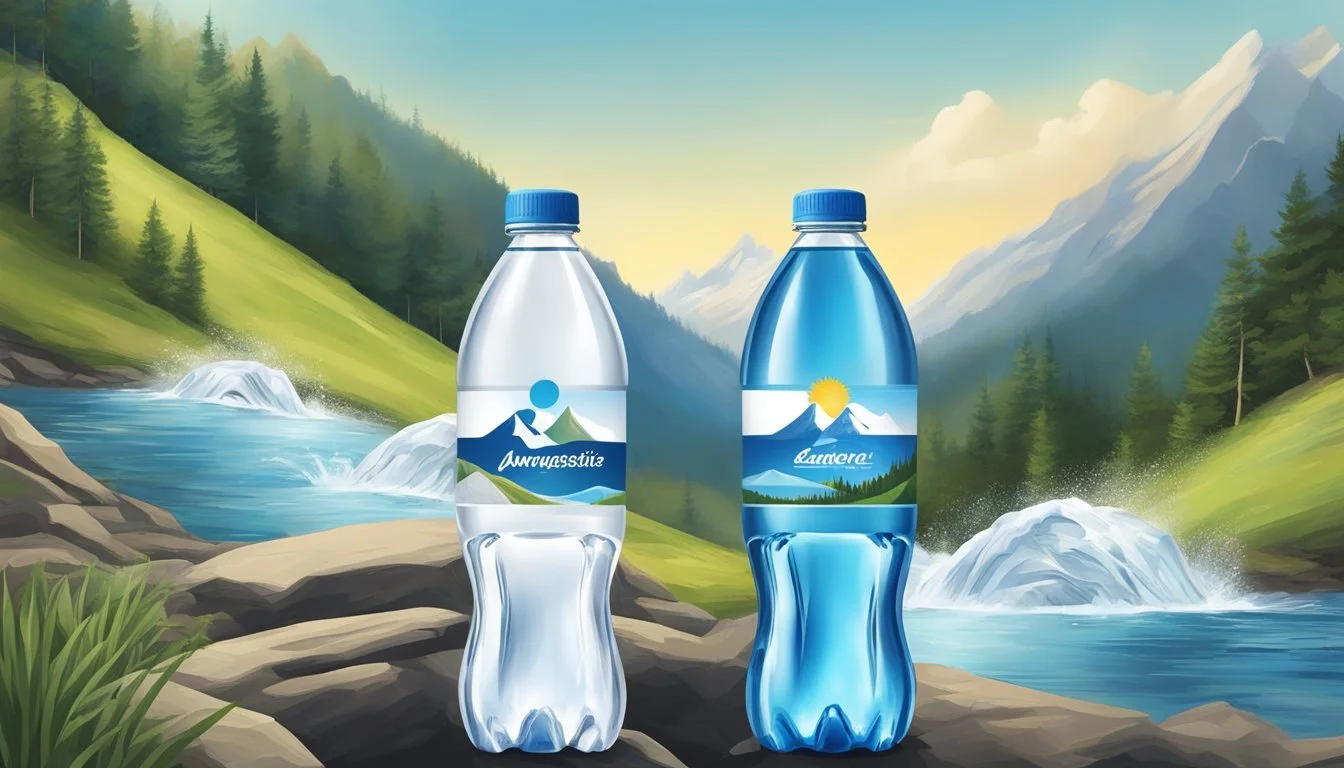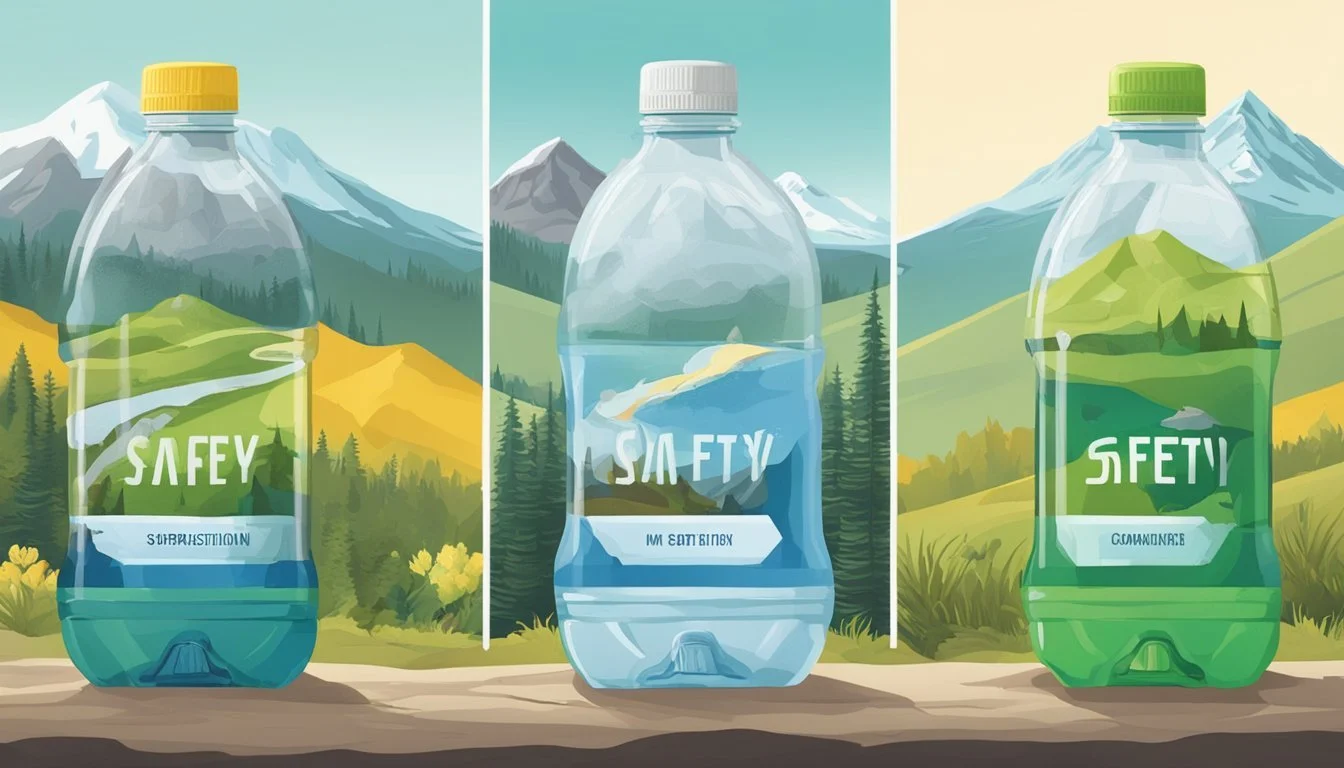Flow vs. Cascade Mountain
The Ultimate Bottled Water Comparison
When it comes to choosing the right bottled water, quality and taste often top the list of priorities. Flow and Cascade Mountain are two brands that have gained popularity for their distinct offerings. Flow, known for its alkaline spring water sourced from natural springs, boasts a clean, smooth taste and a commitment to sustainable packaging.
Cascade Mountain, sourced from the pristine springs of Arkansas, offers a different profile. This brand emphasizes a velvety texture with a slight mineral presence that is both refreshing and slightly sweet. For those who prioritize environmentally-conscious choices and a smooth, alkaline taste, Flow is the preferred option.
On the other hand, consumers who enjoy a subtle hint of minerals in their water and a velvety mouthfeel might lean towards Cascade Mountain. Both brands have their unique strengths, making them stand out in the crowded bottled water market.
Understanding Bottled Water
Bottled water comes in many varieties, each with unique characteristics and regulatory standards. Below are the key aspects to understand about different types of bottled water, water quality indicators, and industry regulations.
Types of Bottled Water
Bottled water can be categorized based on its source and treatment methods. Natural spring water is sourced from underground formations and flows naturally to the surface. Alkaline water has a higher pH, achieved either naturally or through ionization processes.
Some bottled waters, like Nestlé’s Pure Life, undergo treatment processes such as reverse osmosis to remove impurities. There are also artesian waters, collected from aquifers. Each type has unique attributes appealing to different consumer preferences.
Evaluating Water Quality Indicators
Evaluating bottled water quality involves looking at several key indicators. Total Dissolved Solids (TDS) measure minerals and organic matter dissolved in water. Higher TDS can indicate more minerals, while low TDS suggests purer water.
pH levels are critical, especially for alkaline water, where higher pH levels are marketed for purported health benefits. Testing for contaminants like PFAS chemicals is essential, as highlighted by Consumer Reports.
Bottled water companies must regularly test and clearly label mineral content, pH level, and any added substances to inform consumers effectively.
Bottled Water Regulations
Bottled water in the United States is regulated by the Food and Drug Administration (FDA). The FDA sets stringent standards to ensure safety and quality, similar to those imposed on public drinking water by the Environmental Protection Agency (EPA).
Each type of bottled water must meet specific labeling requirements and undergo regular quality testing. Producers must disclose information about the source, treatment methods, and any additives. Compliance with these regulations helps maintain consistency and consumer trust.
The regulatory framework aims to protect consumers, ensuring that all bottled waters, whether treated through reverse osmosis or sourced from natural springs, meet established safety standards.
Origin and Source
The source of bottled water often defines its quality and taste. The origins of Flow and Cascade Mountain are diverse, contributing distinct characteristics to each.
Flow Water Source
Flow's water originates from a natural spring in Canada. It boasts an alkaline pH of 8.1 and is enriched with electrolytes. The spring is situated in an artesian aquifer, surrounded by a pristine environment that ensures purity.
The water undergoes minimal processing to maintain its natural composition. Flow aims to offer sustainable water, packaged in eco-friendly Tetra Pak cartons, reducing its environmental footprint.
Specific minerals, such as calcium, magnesium, and potassium, are present in Flow Water, mimicking the mineral content found in other premium waters like Evian and Icelandic Glacial.
Cascade Mountain Water Source
Cascade Mountain sources its water from the Cascade Range, a volcanic mountain range in the Pacific Northwest. The water is drawn from deep, volcanic aquifers, filtering through layers of volcanic rock.
This natural filtration process is beneficial, as it adds minerals like silica and magnesium, enhancing the water’s taste and health benefits. Cascade Mountain water remains free from contamination due to the mountainous and remote source.
Packaged in BPA-free plastic bottles, Cascade Mountain focuses on ensuring consumer safety and environmental consciousness. The water’s origin in volcanic aquifers places it alongside other respected brands like Fiji and Poland Spring in terms of quality and purity.
Taste and Mineral Content
Both Flow and Cascade Mountain offer distinct flavor profiles along with varying levels of essential minerals that impact both taste and health benefits.
Flavor Profiles of Different Brands
Flow bottled water is known for its smooth and velvety taste. It provides a subtle sweetness and a slightly alkaline nature. This brand is often appreciated for how it feels on the palate, avoiding any harsh aftertaste. Flow uses natural spring sources that contribute to its clean and refreshing flavor.
Cascade Mountain, sourced from springs in the Cascades, delivers a crisp and refreshing experience. It often contains notes of minerality that are more distinct than Flow, providing a robust and slightly tangy finish. The higher mineral content gives it a more pronounced taste, making it a favorite for those who prefer a bolder flavor in their water.
Health Benefits of Essential Minerals
The mineral content in bottled water is crucial for its health benefits. Flow water contains calcium and magnesium, which are beneficial for bone health and muscle function. These minerals make it an excellent choice for those looking to improve their daily intake of essential nutrients.
Cascade Mountain water also boasts a rich profile of minerals, including sodium, calcium, and magnesium. Sodium, in small amounts, assists in electrolyte balance which is crucial for hydration. Magnesium present in both brands is particularly useful for maintaining normal nerve and muscle function.
These essential minerals not only enhance the taste but also contribute significantly to the overall health benefits of drinking bottled water. Their natural source ensures a beverage that supports daily health while satisfying the palate with distinct tastes.
Health and Hydration
Choosing the right bottled water affects overall well-being, particularly in terms of health benefits and hydration levels. Here's a detailed comparison between Flow and Cascade Mountain.
Hydration and Physical Well-being
Proper hydration is crucial for maintaining body functions such as blood circulation, muscle function, and cognitive performance. Flow water is sourced from natural springs and contains essential minerals that can improve hydration efficiency.
Cascade Mountain, sourced from pure mountain springs, is known for its clean taste and mineral content. These minerals help maintain electrolyte balance, aiding hydration and supporting muscle function. Both Flow and Cascade Mountain deliver pure, refreshing hydration that supports physical well-being.
Comparing Alkalinity and pH Levels
The pH level of water can impact its taste and potential health benefits. Flow water boasts a slightly alkaline pH level, generally around 8.1, which some believe helps balance the body's acidity. This may benefit those looking for a milder, less acidic option.
Cascade Mountain water typically has a more neutral pH, closer to 7.0, making it well-suited for those preferring a clean, neutral taste without additional alkalinity. Both options maintain pH levels that are safe and beneficial for daily consumption, with slight variations catering to different preferences.
Environmental Impact
Assessing the environmental impact of bottled water involves understanding its contribution to pollution and the availability of more sustainable alternatives. This section explores how bottled water affects sustainability and what reusable or eco-friendly options are available.
Bottled Water and Sustainability
The production and disposal of bottled water significantly impact the environment. Bottled water production is resource-intensive and generates a substantial carbon footprint. For example, a study found that bottled water has an environmental impact 3,500 times greater than tap water. Furthermore, millions of plastic bottles end up in landfills or oceans, contributing to plastic pollution and harming marine life.
Not all bottled water brands are equal in their sustainability efforts. Flow and Cascade Mountain, for instance, differ in their use of materials and production processes. Flow uses sustainable packaging, such as Tetra Pak cartons, which are more eco-friendly than standard plastic bottles. Cascade Mountain primarily uses traditional plastic bottles, although they have begun exploring the use of recycled materials in their products.
Alternatives to Single-Use Plastic Bottles
Switching to reusable and eco-friendly alternatives can significantly reduce environmental damage. Reusable bottles made from stainless steel, glass, or BPA-free plastics are viable options. These bottles can be refilled multiple times, decreasing the need for single-use plastics.
Boxed water and brands using glass bottles are also gaining popularity for their reduced environmental impact. Boxed water typically uses biodegradable or recyclable packaging and has a lower carbon footprint. Brands like Flow capitalize on this by offering eco-friendly options that appeal to environmentally conscious consumers.
In addition, investing in water filtration systems can provide clean drinking water without the waste associated with bottled water. Filtered tap water is not only better for the environment but also often more cost-effective.
By considering these alternatives, consumers can make choices that promote sustainability and lessen their environmental impact.
Brand Practices and Ethics
When comparing Flow and Cascade Mountain, evaluating corporate responsibility and transparency in quality reports is essential for understanding the broader ethical practices of these brands.
Corporate Responsibility
Corporate responsibility goes beyond just producing bottled water; it addresses how a company impacts society and the environment. Flow emphasizes its commitment to sustainability by using renewable resources for packaging and reducing its overall carbon footprint. The company supports various environmental causes and aims for a closed-loop system.
Cascade Mountain, affiliated with larger corporations such as Nestlé and Coca-Cola, also participates in various sustainability initiatives. These often include water conservation efforts and community engagement projects. Nestlé and Coca-Cola both have robust sustainability goals, including reducing plastic usage and improving water efficiency in their operations.
However, some consumers question the broader impacts of these large corporations, including concerns about water rights and the ethical sourcing of water. It is important to scrutinize these practices to make informed choices about which brand aligns better with one’s values.
Transparency and Quality Reports
Transparency in quality reporting ensures consumers are informed about what they are drinking. Flow provides regular and detailed quality reports, accessible through their website. These reports outline the water’s source, mineral content, and purification processes, ensuring transparency and trust with consumers.
Cascade Mountain also maintains detailed quality reports. Given their affiliation with Nestlé and Coca-Cola, they adhere to stringent international standards, often involving third-party audits and certifications. The International Bottled Water Association (IBWA) guidelines are typically followed, ensuring high standards of safety and quality.
Both brands make an effort to disclose vital information regarding their water’s quality. These practices help build consumer trust and ensure that the bottled water meets or exceeds regulatory standards. Transparent quality reports are crucial for consumers who prioritize safety and purity in their drinking water choices.
Consumer Experience
Evaluating consumer experience involves understanding both the convenience and accessibility of Flow and Cascade Mountain bottled water, as well as analyzing their taste.
Convenience and Accessibility
Flow water is widely available in many grocery stores and online platforms, making it easy for consumers to purchase. Its packaging is environmentally friendly, using Tetra Pak cartons instead of plastic bottles. This appeals to eco-conscious consumers.
Cascade Mountain water enjoys similar availability in physical and online stores. Its recyclable bottles are convenient for consumers who prioritize easy, on-the-go hydration. Both brands offer multiple size options, catering to varying needs.
Taste Test Analysis
Professional water sommeliers often describe Flow water as having a clean, crisp taste. It's sourced from natural springs, ensuring a fresh flavor.
Cascade Mountain water is also praised for its pure taste, though it has a slightly softer mouthfeel according to some taste tests. This subtle difference can be a deciding factor for discerning consumers.
Overall, both brands receive positive taste test results, highlighting their commitment to quality.
Safety and Contamination Concerns
When deciding between Flow and Cascade Mountain bottled water, safety and contamination concerns are critical factors to consider. Both brands face scrutiny for potential contaminants and must comply with industry regulations and standards.
Potential Contaminants in Bottled Water
Studies have revealed that bottled water, including Flow and Cascade Mountain, can contain various contaminants. These can include lead, arsenic, and PFAS chemicals. Lead can leach from aging infrastructure, posing significant health risks. Arsenic, naturally occurring in groundwater, is another potential threat that requires careful monitoring.
Interesting findings have shown that certain brands of bottled water may even contain disinfection byproducts, which are formed when chlorine reacts with natural organic matter. Contaminants such as caffeine and pharmaceuticals have also been detected, highlighting the need for stringent quality checks. Consumers should be aware of the potential presence of these harmful substances and select products from brands known for thorough testing and quality assurance.
Industry Regulations and Standards
Bottled water in the United States is regulated by the FDA, which mandates standards for contaminants and labeling. The EPA sets similar guidelines for tap water, but bottled water must also comply with specific FDA regulations. This includes limits on contaminants like lead and arsenic and required disclosures about the water source and treatment processes.
For example, the FDA and EPA have set a limit of 70 parts per trillion (ppt) for PFAS chemicals, including PFOA and PFOS. This aims to minimize exposure to these potentially harmful substances. Both brands must conform to these regulatory standards to ensure consumer safety. Regular testing and transparent reporting help build consumer trust and ensure that the water is safe to drink.
Comparison and Final Verdict
The examination between Flow and Cascade Mountain bottled water brands will focus on critical factors such as water source, purity, taste, packaging, and consumer feedback.
Head-to-Head Brand Analysis
Source and Purity: Flow water is sourced from an artesian spring and undergoes minimal processing, maintaining natural minerals and a stable pH. Cascade Mountain is also spring water, boasting purity and natural filtration.
Taste: Flow has a crisp, clean taste, influenced by its natural mineral content. Cascade Mountain offers a subtle sweetness with a smooth finish, widely appreciated by consumers.
Packaging: Flow distinguishes itself with eco-friendly paper cartons, whereas Cascade Mountain typically uses recyclable plastic bottles. The environmental impact is a significant consideration for many buyers.
Consumer Feedback: Flow receives praise for both its taste and sustainable packaging. Cascade Mountain is favored for its mineral taste and hydration benefits. Both have loyal followings, though some consumers find Cascade Mountain more widely available.
Making an Informed Choice
When deciding between Flow and Cascade Mountain, buyers should consider their priorities:
Environmental Impact: Flow's commitment to sustainable packaging might appeal to eco-conscious consumers.
Availability: Cascade Mountain might be easier to find in stores, providing convenience for regular buyers.
Taste Preferences: Taste is subjective, but both brands offer distinct flavors that could sway preferences.
Both brands excel in their unique ways, making either a strong choice for bottled water enthusiasts. Whether prioritizing sustainability or seeking superior taste, both Flow and Cascade Mountain offer quality hydration solutions.
More About Flow
Flow vs Whole Foods Italian Still Mineral water: Which Bottled Water is Better?
Mountain Valley Spring Water vs Flow: Which Bottled Water is Better?
More About Cascade Mountain
Acqua Pana vs Cascade Mountain: Which Bottled Water is Better?
Antipodes vs Cascade Mountain: Which Bottled Water is Better?
Aqua Carpatica vs Cascade Mountain: Which Bottled Water is Better?
Aquafina vs Cascade Mountain: Which Bottled Water is Better?
Arrowhead vs Cascade Mountain: Which Bottled Water is Better?
Boxed Water vs Cascade Mountain: Which Bottled Water is Better?
Cascade Mountain vs 1907water: Which Bottled Water is Better?
Cascade Mountain vs 7-Select: Which Bottled Water is Better?
Cascade Mountain vs Alkaline88: Which Bottled Water is Better?
Cascade Mountain vs Big Chill: Which Bottled Water is Better?
Cascade Mountain vs BodyArmor: Which Bottled Water is Better?
Cascade Mountain vs CBD Living: Which Bottled Water is Better?
Cascade Mountain vs Crystal Geyser: Which Bottled Water is Better?
Cascade Mountain vs Crystal Lake: Which Bottled Water is Better?
Cascade Mountain vs Essence pH10: Which Bottled Water is Better?
Cascade Mountain vs Kirkland Signature: Which Bottled Water is Better?
Cascade Mountain vs Open Water: Which Bottled Water is Better?
Cascade Mountain vs Proud Source: Which Bottled Water is Better?
Cascade Mountain vs Pure Life: Which Bottled Water is Better?
Cascade Mountain vs Refreshe: Which Bottled Water is Better?
Cascade Mountain vs Richard's Rainwater: Which Bottled Water is Better?
Cascade Mountain vs Simple Truth: Which Bottled Water is Better?
Cascade Mountain vs Talking Rain AQA: Which Bottled Water is Better?
Cascade Mountain vs The Well: Which Bottled Water is Better?
Cascade Mountain vs Weird Water: Which Bottled Water is Better?
Cascade Mountain vs Whole Foods 365: Which Bottled Water is Better?
Castle Rock vs Cascade Mountain: Which Bottled Water is Better?
Core Hydration vs Cascade Mountain: Which Bottled Water is Better?
Deer Park vs Cascade Mountain: Which Bottled Water is Better?
Essentia vs Cascade Mountain: Which Bottled Water is Better?
Hawaii Volcanic vs Cascade Mountain: Which Bottled Water is Better?
Hawaiian Springs vs Cascade Mountain: Which Bottled Water is Better?
Ice Mountain vs Cascade Mountain: Which Bottled Water is Better?
Icelandic Glacial vs Cascade Mountain: Which Bottled Water is Better?
Just Water vs Cascade Mountain: Which Bottled Water is Better?
Liquid Death vs Cascade Mountain: Which Bottled Water is Better?
Mananalu vs Cascade Mountain: Which Bottled Water is Better?
Mountain Valley Spring Water vs Cascade Mountain: Which Bottled Water is Better?
Nestle Pure Life vs Cascade Mountain: Which Bottled Water is Better?
Poland Spring vs Cascade Mountain: Which Bottled Water is Better?
Purely Sedona vs Cascade Mountain: Which Bottled Water is Better?
San Pellegrino vs Cascade Mountain: Which Bottled Water is Better?
Smartwater vs Cascade Mountain: Which Bottled Water is Better?
Solan de Cabras vs Cascade Mountain: Which Bottled Water is Better?
Topo Chico vs Cascade Mountain: Which Bottled Water is Better?
Tru Alka vs Cascade Mountain: Which Bottled Water is Better?
Whole Foods Italian Still Mineral water vs Cascade Mountain: Which Bottled Water is Better?
Zephyrhills vs Cascade Mountain: Which Bottled Water is Better?








